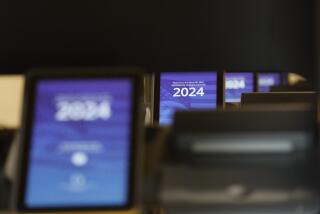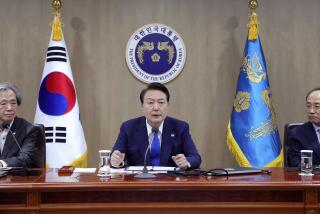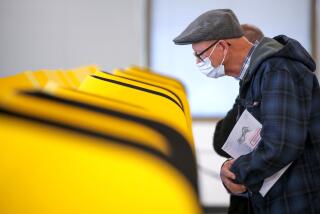How do you hold an election in the midst of a pandemic? South Korea tries to lead the way
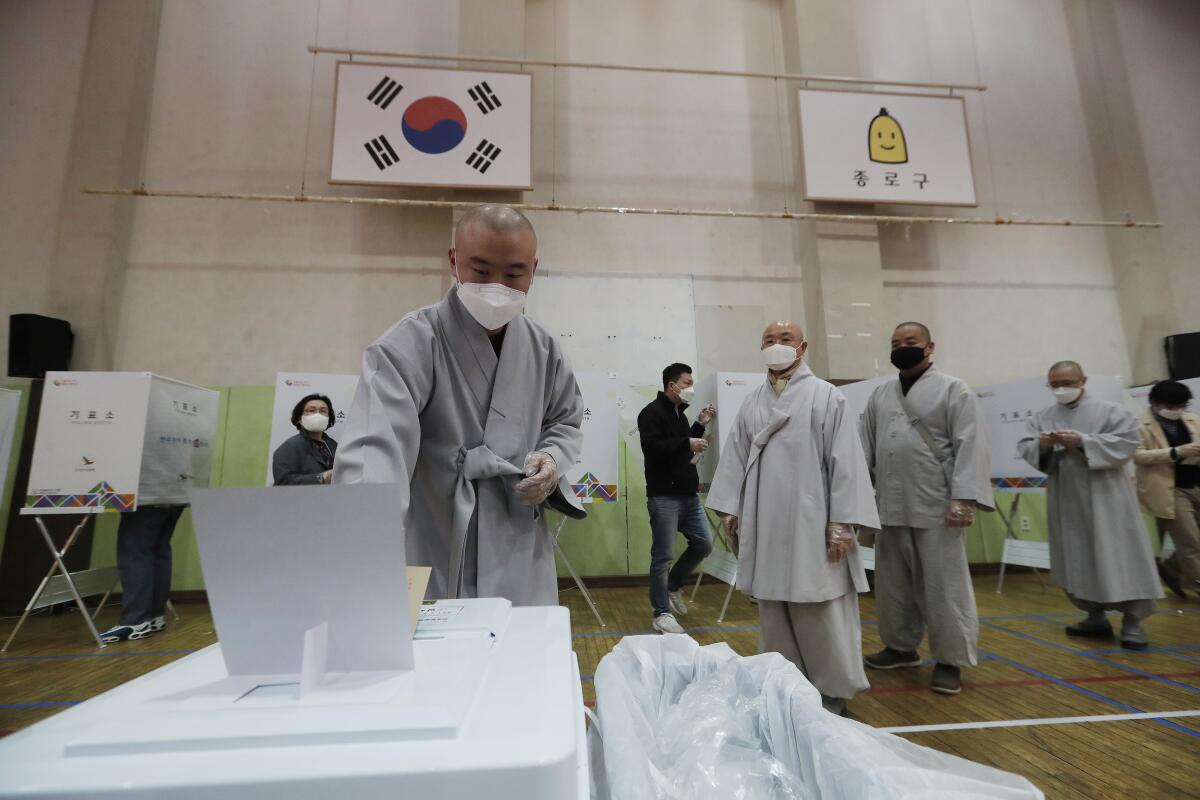
At a time when most governments are urging citizens to stay at home, one country is calling on them to come out in force this week — to the polls.
South Korea is going ahead with its hotly contested parliamentary elections Wednesday, even as nations around the world, from Britain to Bolivia, have postponed races out of coronavirus concerns and a primary this month in Wisconsin raised myriad worries about safety and disenfranchisement.
With nearly 4 out of 5 South Koreans saying they intend to cast a ballot and early voting already logging record turnout, the country may offer an early look at how to hold a general election in the midst of a pandemic.
In his off time, medical ICU nurse Oh Young-jun sketches scenes from his job within a coronavirus isolation ward in South Korea.
Election officials have assured citizens that they are taking every precaution to keep voters safe. All voters are being required to wear masks, and polling stations are being thoroughly sanitized. Poll workers wearing gloves, masks and protective face shields will take each voter’s temperature, squirt his or her hands with sanitizer and then distribute a pair of disposable gloves.
Anyone with a fever or other coronavirus-related symptoms will be routed to a separate voting booth, which will be disinfected after each use.
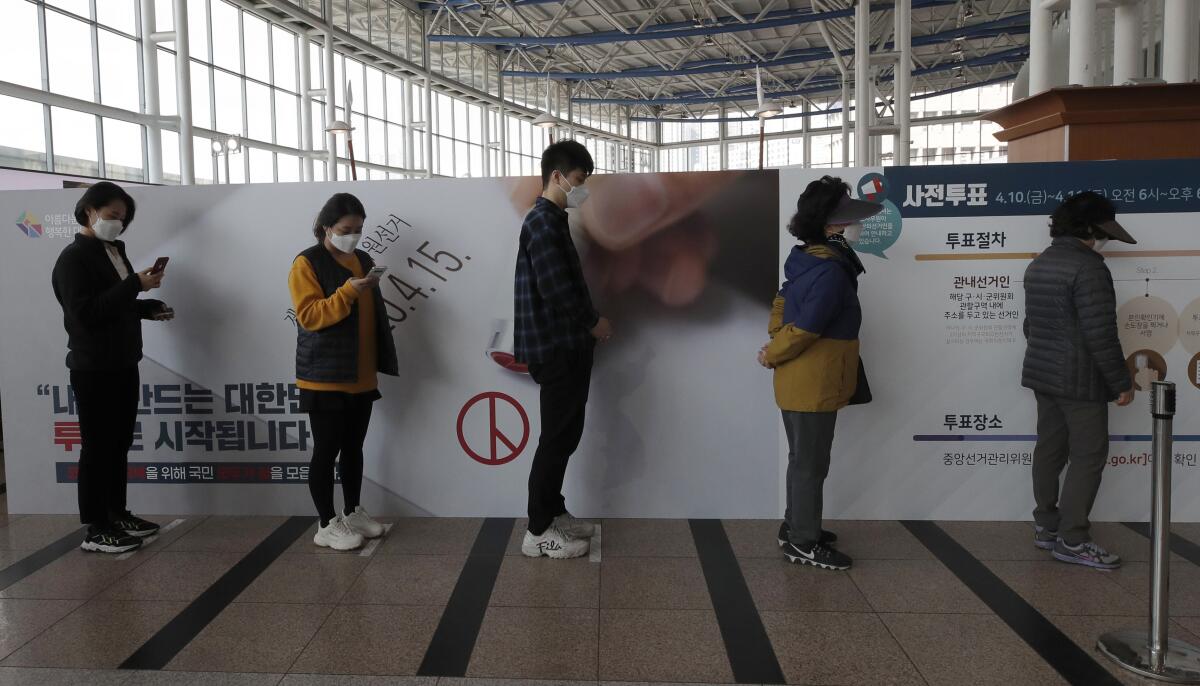
After much debate, the government also announced measures to allow those under mandatory 14-day quarantine — people who have traveled abroad or come into contact with a known COVID-19 patient — to leave their homes during a 1 hour, 40-minute window Wednesday evening to cast their ballots. Only those without symptoms will be permitted to do so, and they’re required to walk or drive themselves to the polls rather than take public transit.
Some coronavirus patients under quarantine also had the option of voting by mail, which South Korea typically allows only in limited cases.
Despite the COVID-19 pandemic, more than a quarter of eligible voters turned out for early voting over the weekend in an election widely viewed as a referendum on the presidency of Moon Jae-in. Moon, a liberal, was voted into office in 2017 after his predecessor was impeached in a corruption scandal that triggered a large-scale protest movement that filled the streets of Seoul.
Before the pandemic, the elections were shaping up to be dominated by South Korea’s lackluster economy and Moon’s stalled policy of engagement with North Korea, which has been at an impasse since talks between the U.S. and North Korea fell apart.
But the virus changed everything.
Even though Moon made an early blunder, prematurely saying out of concern for the economy that the outbreak would be over soon, politicians in South Korea have largely stayed out of the way of the disease-control professionals who took charge of the epidemic response.
Systems and laws kicked in that had been created after the government’s bungled handling of an outbreak of Middle East respiratory syndrome, or MERS, in 2015. Daily COVID-19 infections, after a surge in late February, slowed to fewer than 30 new cases this week. The country’s success in controlling the outbreak and flattening the curve of new infections has received acclaim and attention from around the world.
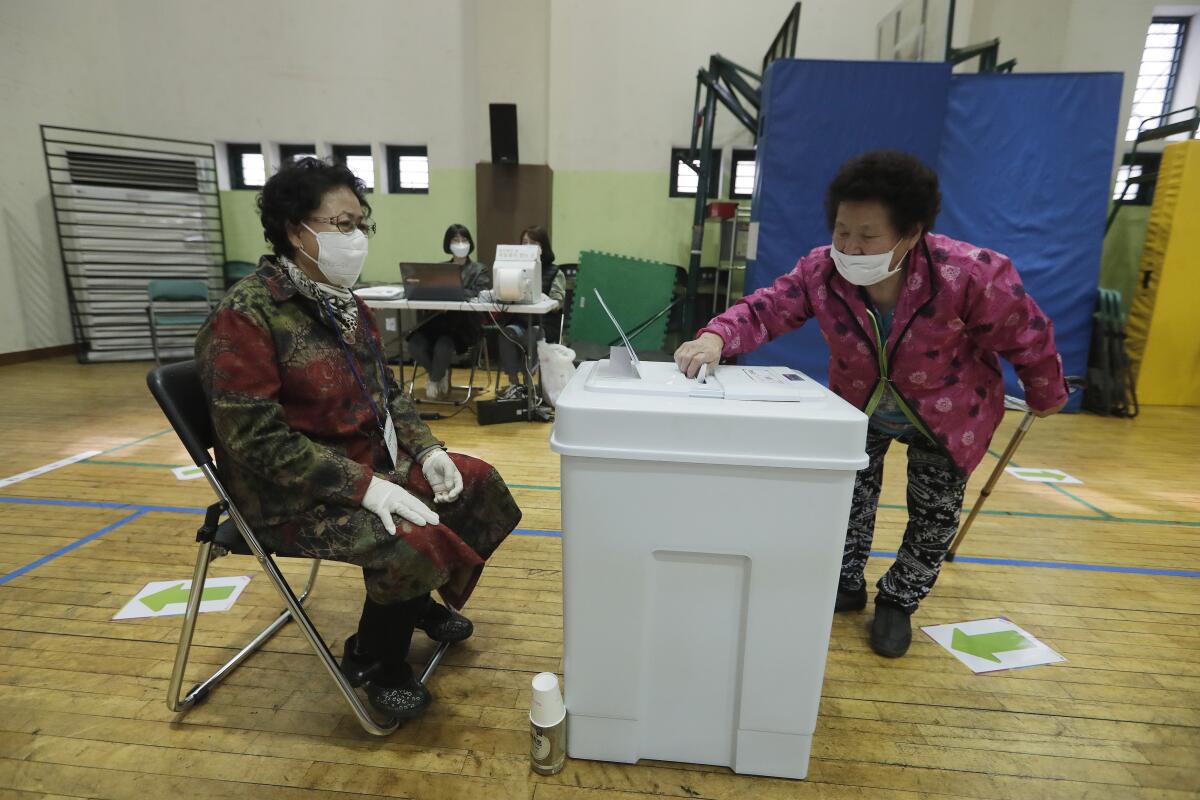
That’s translated into the highest approval ratings for Moon — 57% — since 2018, according to Gallup Korea.
Moon said Monday that the election could serve as an example to other countries still struggling to curb the epidemic. “If we can maintain the results of our disease-prevention efforts while holding nationwide elections, we can give the world the hope that it’s possible to return to normal social systems and daily activities,” he said.
Running for seats in South Korea’s 300-seat parliament are a high-profile former North Korean diplomat who defected to the South, young feminists who’ve formed their own party on a platform against misogyny and sexism, and two former prime ministers going head to head in a district in central Seoul.
On street corners in recent weeks, campaigners courted voters wearing jackets, hats and matching face masks in each political party’s color.
At competing rallies in the race between the two former premiers, enthusiasm for the candidates appeared to trump any social distancing concerns as citizens mobbed candidates for photos and handshakes.
The opposition has largely supported the government’s anti-virus efforts but has faulted Moon for not swiftly banning travel from China and accused him of taking advantage of South Korea’s coronavirus-related economic stimulus to buy votes.
Hwang Kyo-ahn of the conservative main opposition United Future Party did not mention the coronavirus once in a 15-minute speech, focusing instead on economic woes and taxation.
“If he mentions it, he’s just helping the incumbents. I’m on this side [of the political spectrum], but a good job is a good job,” said Lee Wan-jae, a 67-year-old taxi driver watching Hwang’s speech, who said he always voted with the conservatives. “With the coronavirus, it’s not the administration but the public health officials who are doing good work. They’re trying to free-ride on that.”
Lee said his primary concern was the economy — he stopped driving a couple of months ago because he wasn’t getting enough fares. He said he wasn’t optimistic about either party being able to turn the economy around.
Across the street, Lee Nak-yeon, who served as Moon’s prime minister until January, stumped primarily on praising the current government’s coronavirus successes.
“Isn’t South Korea really remarkable?” he said, noting that treatment for COVID-19 for one individual in the U.S. would cost many times more the amount — 40,000 Korean won, or about $32 — it would cost the average South Korean patient. “We seem like a small country, but we’re not a small country.”
Jun Sung-man, a 29-year-old occupational therapist, said he was a moderate but planned on voting for Moon’s liberal party because of the current government’s outbreak response — and the couple of hundred dollars in a stimulus check he was due to receive.
“They’re dealing with the coronavirus in a transparent way and doing a good job of implementing policy,” he said.
More to Read
Start your day right
Sign up for Essential California for news, features and recommendations from the L.A. Times and beyond in your inbox six days a week.
You may occasionally receive promotional content from the Los Angeles Times.
